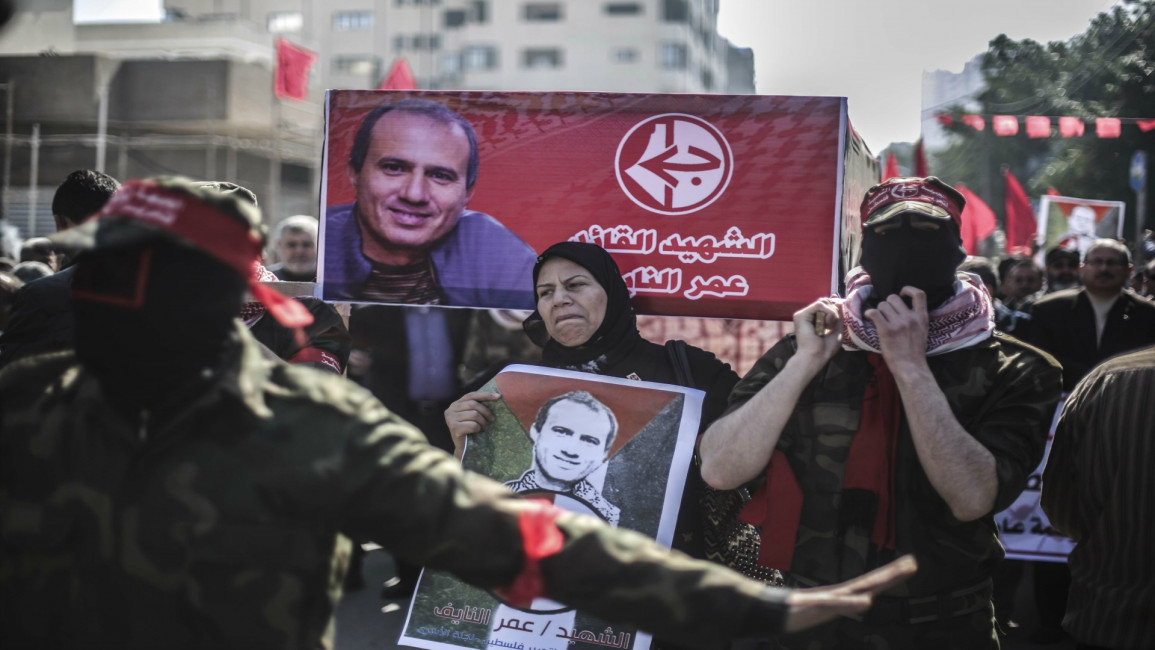
The final nail in the Palestinian Authority's coffin
The assassination of PFLP member Omar Nayef Zayed last month at the Palestinian embassy in Bulgaria exposed the duplicity espoused by the Palestinian Authority, as well as confirming its incapability of providing proper protection for Palestinians targeted by Israel.
Zayed, who managed to escape from prison in 1990 after serving four years of his life sentence, had been living in Bulgaria since 1994.
In December 2015, the Israeli Embassy in Bulgaria corresponded with the Bulgarian Ministry of Justice, requesting Zayed's extradition and calling him "a fugitive from justice", leading him to seek sanctuary at the embassy. The Samidoun Palestinian Prisoner Solidarity Network, meanwhile, was at the helm of the international campaign demanding that any attempts to hand Zayed to Israel be immediately cancelled, arguing that the extradition of political prisoners was illegal.
Samidoun coordinator Charlotte Kates explained that the campaign to stop Zayed's extradition ran contrary to the PA's intentions.
"The campaign for Omar Nayef Zayed began when Omar was first demanded for extradition and first entered the embassy," she said. "It was comprised of legal, political and grassroots channels of struggle to stop the extradition and ensure his safety. And rather than doing all it could to strengthen the campaign for Omar, the PA and particularly the embassy in Bulgaria, repeatedly subjected Omar to extensive pressure in order to push him out of the embassy and silence the campaign in his support."
As the campaign intensified, so did pressure upon Zayed from Israel, the Bulgarian authorities and the Palestinian embassy itself. Zayed could not have chosen a worse place to seek refuge. Far from protecting him, the embassy constantly pressured him to leave the premises.
He was ultimately left unprotected at the embassy and murdered, pushing the PA's potential for complicity into the limelight.
 |
It happened only hours after Bulgarian Prime Minister Boiko Borisov discussed the possibility of extradition with Israeli and PA officials |  |
Contradictory reports
Initial reports contained vague and often contradictory information. AP offered convenient rhetoric in its reporting of the crime, stating that Zayed had "plunged to his death". However, the report does mention the opportune timing with regard to the assassination, noting that it happened only hours after Bulgarian Prime Minister Boiko Borisov discussed the possibility of extradition with Israeli and PA officials during a visit to Israel and the occupied Palestinian territories.
News reports also varied in tone with regard to the violence sustained by Zayed, with statements being made and later retracted or contradicted. Zayed's family said signs of violence - which bore resemblance to assassinations by Mossad - were evident; statements that were supported by embassy representatives.
Later, however, officials insisted there was no evidence of any violence or struggle.
The Times of Israel sought to mellow the killing's severity and insisted that Israel denied involvement, but its headline discussing the case clearly stipulated "murder" as the cause of Zayed's death. The consensus between assertions regarding the assassination was not an issue that should be ignored.
Given the level of collaboration between Israel and the PA, Zayed's assassination is yet another manifestation of the fact that the PA functions within the dynamics of dependency, to the extent that it is incapable of offering proper protection for Palestinians.
Conversely, it has the means at its disposal to extend the role of security coordination with Israel far beyond the confines of the occupied Palestinian territories.
 |
The injustice suffered by Zayed should be discussed in relation to the PA's collaboration with Israel |  |
PA corruption and the refusal to protect
Campaigner Kates is adamant that this case has demonstrated the corruption that characterises the Palestinian Authority.
The killing of Zayed, which is now the focus of several investigations including those undertaken by his comrades, shows that pursuing justice and accountability should be considered from various angles. More importantly, the injustice suffered by Zayed should be discussed in relation to the PA's collaboration with Israel and its refusal to protect the rights of Palestinian people.
"Palestinians have broadly expressed and continue to express their disgust and outrage at what happened to Omar inside the Palestinian embassy," said Kates. "Indeed, this case has truly underlined that, not only is the Palestinian Authority corrupt inside Palestine, its institutions outside Palestine are rife with the same corruption and refusal to struggle for the Palestinian people and their interests. Omar's family is pursuing various mechanisms to ensure accountability."
Rather than isolate the assassination of Zayed, this latest aggression against Palestinian resistance should be seen as an extension of the violence faced by Palestinians on a daily basis - and which is disseminated by mainstream media as mere routine occurrences rather than severe violations of human rights.
Ridiculing Palestinian resistance has featured at intervals in discourse by PA officials since Mahmoud Abbas blamed Gaza's armed groups for Israel's Operation Protective Edge in 2014.
Yet it was Israel and the security coordination agreement which resulted in collective punishment and mass incarceration of Palestinians in the West Bank.
Internationally, the PA still garners undeserved recognition. It is imperative that this stance by equally culpable governments bolstering Israel's colonial project as well as planned targeted assassinations in collaboration through thinly veiled acquiescence be stopped and perceived as treachery, rather than a predictable farce.
Ramona Wadi is an independent researcher, freelance journalist, book reviewer and blogger specialising in the struggle for memory in Chile and Palestine, colonial violence and the manipulation of international law. Follow her on Twitter: @walzerscent
Opinions expressed in this article remain those of the author and do not necessarily represent those of The New Arab, its editorial board or staff.




